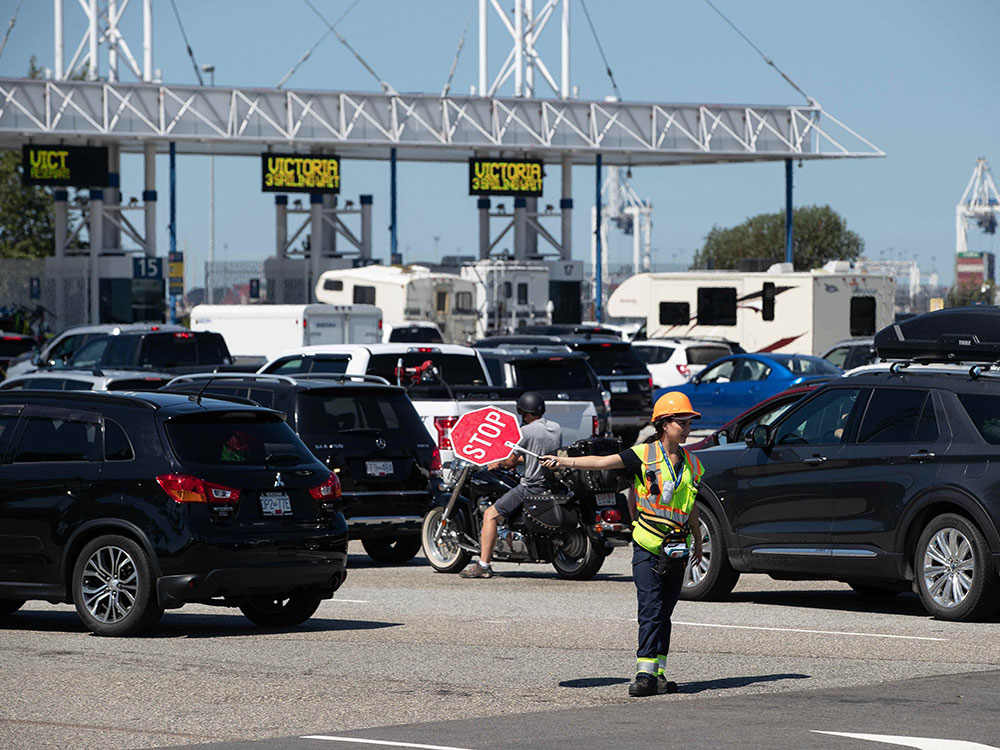BC Ferries’ cancellation crisis is a fine example of what’s gone wrong in Canada’s labour market.
It’s not a shortage of workers, as BC Ferries — to its credit — acknowledges.
BC Ferries has been cancelling record numbers of sailings. The main problem is a lack of workers. Transport Canada sets minimum crew requirements, and ferries can’t sail if even one person is missing.
In the fiscal year ending March 31, 2020, 25 sailings were cancelled because of crew shortages. Last year, 1,163 sailings — more than 20 a week — were cancelled because BC Ferries couldn’t get enough people to work. (In total, cancellations rose from 1,511 to 2,886 in that period, with weather responsible for 757 cancellations and mechanical problems responsible for 648.)
For some travellers, cancellations are an inconvenience.
But for many they are much worse — missed critical medical appointments, family events, job interviews, visits to a spouse in care. For tourists from other provinces or the north or the Interior, a carefully planned vacation can be blown up by BC Ferries.
On the Thursday before Canada Day, for example, people hoping to travel between Powell River and Comox (Westview to Little River) were notified their morning sailing was cancelled, and the entire day’s schedule was at risk. (Fortunately, one more employee was found to fill out the crew for the afternoon.)
So why can’t BC Ferries find workers?
Because, like many employers complaining about labour shortages, it’s offering crappy jobs.
BC Ferries is a former Crown corporation turned into a faux-independent business in 2003 by the BC Liberals. As part of that process, the BC Ferry Commission was created to provide independent oversight. BC Ferries is required to provide updates to the commission.
Which it did in March, with a commendably frank filing about cancelled sailings and its inability to get workers.
BC Ferries reported that its inability to attract workers was partly the result of the pandemic. Travel collapsed and its financial future was in doubt, so it limited hiring full-time employees and instead hired a large number of casual employees.
At the same time, the corporation reported it “began to experience increased levels in workforce anxieties and physical sick time, with an increased number of mental health leaves of absence, short-term disability claims and increased sick leave usage.” Relations with the union were strained by an increasingly disgruntled workforce.
Partly it’s about money. The BC Ferries and Marine Workers’ Union negotiated a new deal in 2020 that froze wages for the 2021 fiscal year and provided two-per-cent increases in 2022 and 2023. During that same period, B.C.’s cost of living increased by more than 12 per cent. The contract includes a provision to reopen wage bargaining next year. BC Ferries has agreed to start wage talks next month with the goal of an increase in October.
Partly, the corporation says, it’s about an overworked human resources department, swamped by pandemic issues, plagued by high turnover and unable to manage workplace issues.
But mostly it’s about bad jobs, which people had been willing to accept in the past when they had fewer options.
“The bulk of BC Ferries operational hiring involves casual and seasonal positions,” the corporation reports. “Employees in these roles traditionally have been expected to be ‘on call’ 24 hours a day and seven days a week, which inhibits them from holding a second job, attending school or making other personal commitments.” Parents are also somehow magically expected to arrange child care.
Employees don’t get paid for being on call, and if they turn down shifts three times they get fired.
It is a classic example of job created entirely to serve the employer’s interests.
And it is common far beyond BC Ferries.
The corporation notes other barriers. Food services staff are expected to pay for their own Serving it Right and Food Safe certifications, and required medical reports. The corporation reports that these roles “have had limited access to internal training and limited corporate commitment for career development.”
And when new employees are hired, they do initial training and then wait weeks, sometimes months, with no pay before getting shifts as the corporation arranges on-board training. Last year, almost 30 per cent of seasonal employees quit before the middle of the peak season.
Again, BC Ferries deserves much credit for setting out the problems — and attempting to address them with measures such as guaranteed minimum pay for seasonal employees, retention bonuses and advancing the date for renegotiating wages.
Attracting and keeping workers will cost more. And the money will come from higher fares, or a larger provincial government subsidy, which seems like a reasonable option. The province is providing $201 million to BC Ferries this year compared to $227 million four years ago.
The problem isn’t a labour shortage — but the failure of employers to offer jobs that provide enough money to live on, and enough security to live without fear about what lies ahead.
Ferry users, of course, are left wondering if they’ll have a reliable service anytime soon. ![]()
Read more: Transportation, Labour + Industry

















Tyee Commenting Guidelines
Comments that violate guidelines risk being deleted, and violations may result in a temporary or permanent user ban. Maintain the spirit of good conversation to stay in the discussion and be patient with moderators. Comments are reviewed regularly but not in real time.
Do:
Do not: